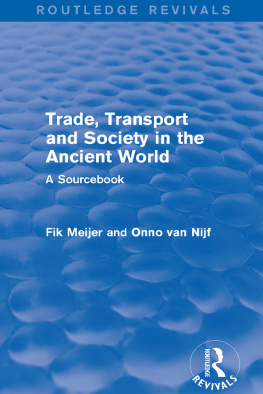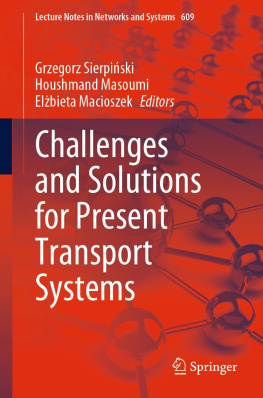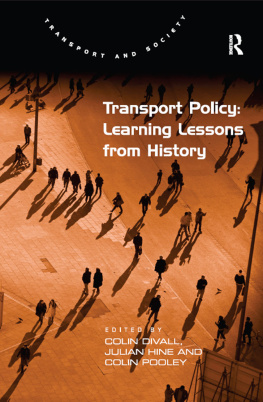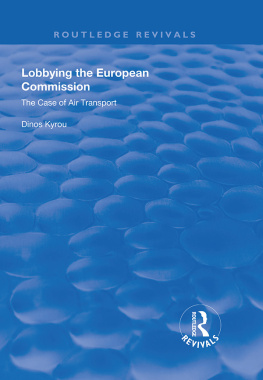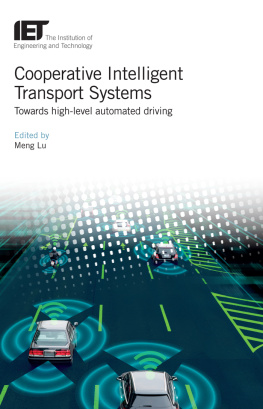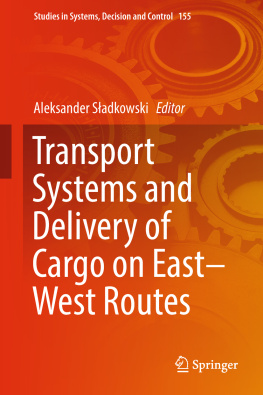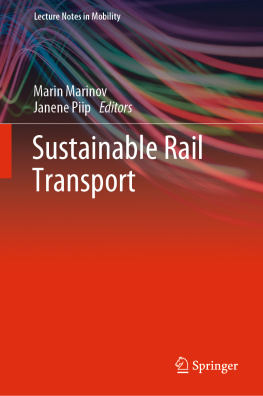TOWARDS ENVIRONMENTAL SUSTAINABILITY?
Towards Environmental Sustainability?
A comparative study of Danish, Dutch and Swedish transport policies in a European context
Emin Tengstrm
Aalborg University
First published 1999 by Ashgate Publishing
Reissued 2018 by Routledge
2 Park Square, Milton Park, Abingdon, Oxon, OX14 4RN
52 Vanderbilt Avenue, New York, NY 10017
Routledge is an imprint of the Taylor & Francis Group, an informa business
Copyright Emin Tengstrm 1999
All rights reserved. No part of this book may be reprinted or reproduced or utilised in any form or by any electronic, mechanical, or other means, now known or hereafter invented, including photocopying and recording, or in any information storage or retrieval system, without permission in writing from the publishers.
Notice:
Product or corporate names may be trademarks or registered trademarks, and are used only for identification and explanation without intent to infringe.
Publisher's Note
The publisher has gone to great lengths to ensure the quality of this reprint but points out that some imperfections in the original copies may be apparent.
Disclaimer
The publisher has made every effort to trace copyright holders and welcomes correspondence from those they have been unable to contact.
A Library of Congress record exists under LC control number: 99073391
ISBN 13: 978-1-138-36540-7 (hbk)
ISBN 13: 978-0-429-43073-2 (ebk)
The present study was carried out at Aalborg University in Northern Denmark in the period September 1995 - August 1998. It was financed by the Danish Transport Council in Copenhagen. Being a part time Research Professor (approximately half time), I was accepted as a full member of the Department of Development and Planning and its Traffic and Transport Group. Now that the task is completed, I want to express my sincere thanks for the way I was received, particularly to the members of the Traffic and Transport Group and its secretary.
During my stay at Aalborg, I also had the privilege of being able to discuss with a national group of reference. These discussions were not only of great help in many concrete questions but I was also able to profit from the intellectual stimulation of these contacts. The members of this group were: Dag Bjmland, Bent Flyvbjerg, Henrik Gudmundsson, Susanne Krawack and Otto Anker Nielsen. I am very grateful for their help and support.
There are also quite a few colleagues and specialists who have read and commented on different parts of the study: Christian Azar and Karl-Erik Eriksson, Gteborg (). I thank them all for their interest and many useful comments.
Gillian Thylander, Gteborg, has corrected my English in a careful way. I thank her warmly for her dedicated work, and particularly for her ability to understand what I really intended to express.
Finally, it should be underlined that the responsibility for all remaining errors and mistakes are exclusively mine.
- ACEA= Association des Constructeurs Europens d'Automobiles
- BAT- Best Available Technology
- CO - Carbon Oxide
- CO2= Carbon Dioxide
- COREPER= Committee of Permanent Representatives (in Brussels)
- CTP= Common Transport Policy (of the Europan Union)
- ECMT= European Conference of Ministers of Transport
- EEC= European Economic Community
- EIA= Environmental Impact Analysis
- EIS= Environmntal Impact Statement
- EMC= Ecological Modernization Capacity
- ERT= European Round Table of Industrialists
- ERTICO= European Road Transport Telematics Implementation Coordination Organisation
- EST= Environmentally Sustainable Transport
- EU= European Union
- EUROPIA= The European Petroleum Industry Association
- FIA/AIT= Federation Internationale de l'Automobile/Alliance Internationale de Tourisme
- GDP= Gross Domestic Product
- GHG= Greenhouse Gases
- IEA= International Energy Agency
- IFR= International Road Federation
- IIASA= International Institute for Applied Systems Analysis
- IPCC= Intergovernmental Panel on Climate Change
- LPG= Liquified Petroleum Gas
- MaTs= Miljanpassat transportsystem (=Environmentally Sustainable Transport System)
- NGO= Non Governmental Organizations
- NOx= Nitrogen Oxides
- NPP1= The First National (Dutch) Environmental Plan
- NPP2= The Second National (Dutch) Environmental Plan
- OECD= Organization of Economic Cooperation and Development
- OPEC= Organization of the Petroleum Exporting Countries
- OICA= Organisation Internationale des Constructeurs d'Automobiles
- RIVM= The (Dutch) State Instititute for Public Health and Environmental Protection
- SCB= Statisti ska Centralbyrn (The Swedish National Bureau of Statistics)
- SEA= Strategic Environmental Assessment
- SEI= Stockholm Environmental Institute
- SEPA= Swedish Environmental Protection Agency
- SIKA= Swedish Institute for Communication Analysis
- SOU= Statens Offentliga Utredningar (Reports of Swedish Investigative Commissions)
- SVV1= the First (Dutch) Transport Structure Plan
- SVV2= the Second (Dutch) Transport Structure Pian
- TEN= Trans-Europan Networks
- T&E- Transport and Environment (an environmental organization)
- UN= United Nations
- UNEP= United Nations Environmental Programme
- UU= Utrikesutskottet (the Swedish Parliament's standing committe on foreign affairs)
- VOC= Volatile Organic Compounds
- WCED= World Commission on Environment and Development
- WEC= World Energy Council
- WWF= World Wide Fund for Nature
The Character of the Study
The present publication is mainly an empirical study of Danish, Dutch and Swedish national transport policies in the period 1987-1997. It has its focus on the question to what extent current transport policies have been able to enhance environmental sustainability.
Empirical studies of transport policies are rare, at least in comparison with other kinds of transportation studies. For instance, scientific interest in suggesting new policy options for realising sustainable transport has been rapidly increasing during the last few years.
In the present study, the two approaches have been combined. The major part of it () consists of an empirical analysis of current transport policies in the three countries but, in the final chapter, the author suggests some policy options for the near future, intended to reduce the present unsustainable character of the national transport systems to some extent.
The basic idea behind the study was to make a comparison of transport policies in three North European countries selected for their reputation for well developed environmental policies: Denmark, the Netherlands and Sweden. Little attempt had been made to compare national transport policies previously.
On the other hand, a number of comparative studies of national environmental policies had been published during the last few years. Since its focus is on environmental sustainability, the present work is able to draw on theories used by such studies.


